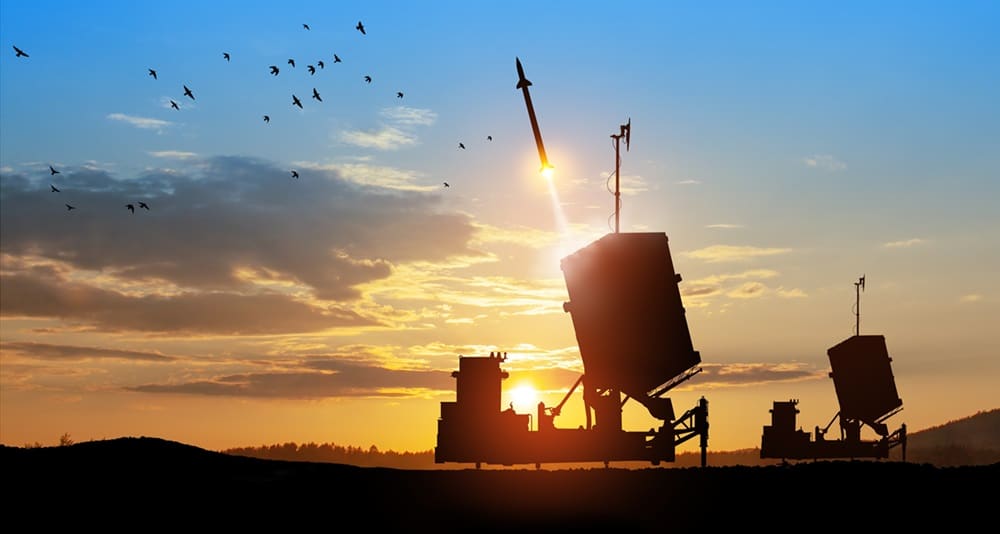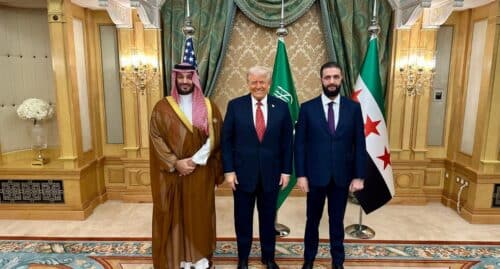
The Iranian barrage was a complete failure. It produced important opportunities that could be beneficial for the State of Israel. However it also has implications that could put the entire region in danger, possibly the entire world.
The Iranian attack that was launched on the night between April 13th and 14th took me back to 1991. That same year I was a young Lieutenant Company Commander at an Engineers Corps Basic Training base. In the background, the Gulf War had begun, in which for the first time ballistic missiles were fired from Iraq into Israeli territory. The State of Israel at the time had no way of coping with this threat. The then-Prime Minister, the Late Yitzhak Shamir, realized this and, although he was known as a hard-line leader, he chose not to respond and let the Americans operate in our place.
In the aftermath of the Gulf War Israel realized that it has got to establish a defensive net over the country’s airspace in order to be able to independently cope with future threats. Over the years this net developed and evolved. Initially it was called the anti-aircraft network, then renamed Air Defense Network, following realization that the threats come not necessarily in the form of aircraft, rather they also come from missiles, rockets, UAVs and drones. Over time the interception systems also developed. We started with the Arrow system – an anti-ballistic missile system. Later on the Iron Dome system that provides defense against short-range rockets, and the David’s Sling system, which defends against cruise missiles and part of the UAV threats. At the same time the capabilities of the Israeli Air Force also developed. Some of the interceptions are indeed achieved by aircraft as we saw in the case of the most recent salvo from Yemen.
The air defense network has been well-tested in responding to attacks by Hamas and Hezbollah, however this latest attack has been the real test for it since it was the first time the network was required to defend against munitions being launched directly from Iranian soil. The attack was extremely massive. It included over 300 launches of UAVs, cruise missiles, and ballistic missiles. Despite this immense challenge, the State of Israel, combined with efforts of the Americans and Jordanians, succeeded in intercepting 99% of this barrage. This is an historic, unprecedented achievement from the defensive perspective, however it is important to understand that this event has major implications that are going to have an impact on the overall conflict.
We have been handed opportunities at negligible cost – now they just need to be seized upon
In this attack, Iran attempted to restore its honor but the actual result was that it proved its feebleness in terms of its image and of its political and military stature. This has delivered important opportunities for Israel at virtually no cost.
In terms of its image, we saw that Iran is weaker than we had expected and that Israel is in fact more powerful than we could have hoped. According to foreign media reports, roughly half of the rockets disintegrated on their way toward Israel. This is indicative of the relatively low level of fitness for purpose of the Iranian systems. At the same time, the State of Israel exhibited unprecedented defensive capabilities, proving beyond a shadow of a doubt that it was capable of coping with the Iranian missile threat. Thus, after so many years in which the question hung in the air as to what would happen should Iran attack us, we were given the opportunity to witness the hollowness of the Iranian onslaught and to rid ourselves of the deep anxieties we had been harboring.
The second opportunity this Iranian attack has produced relates to world public opinion. Behind very move in the Swords of Iron War are Iranian fingerprints. However so far it has managed to differentiate between itself and the proxies it operates, avoiding taking any blame upon itself. This Iranian attack has brought it out of the shadows and exposed it in all its malice. From now on it is unequivocally clear just how dangerous a threat Iran is to the world.
From the Iranian side this is a tremendous strategic mistake since now both Europe and the United States realize that they have got to clip its wings. Already on the morning after the attack, the G7 convened and all the leaders of the industrialized countries condemned Iran. I predict that there is in this an opportunity to renew the drive for painful sanctions on all matters related to development of Iran’s nuclear capabilities. Such sanctions will not only slow down its military force buildup, they will also deal a severe blow to the languishing Iranian economy, thereby posing a potent threat to the regime.
It is important to understand that it is not only the western public opinion that has changed following the attack. The Arab countries, too, the ones on the opposite side of Iran, now realize that Iran is the snake’s head, and that it is imperative that they join forces against it. The third opportunity we have been given, therefore, is added impetus to forming an alliance with the Saudis and with the entire Sunni world to counteract the dangers Iran poses to the region.
The forth and most important opportunity is that we have achieved a reversal of the narrative. At the outset of the war, Israel enjoyed virtually full support from the world powers but this support very quickly turned into severe criticism. Now the spotlight is on Iran and Israel is once again perceived as the victim. It now has renewed legitimacy to defend itself. This reversal can provide us the vital leeway we need to enable us to complete the mission in Gaza and also to deal with Hezbollah in Lebanon.
The American Policy: a dangerous message to enemy powers
Besides the important opportunities we have been given, the Iranian attack also highlights the great danger inherent to the United States’ passive policy.
The United States is not just an ally of Israel – it is a global power and a significant regional power. As such, it bears the responsibility to preserve its deterrence so as to guarantee global stability. The United States is, in effect, projecting weakness and, instead of preventing conflicts, it is actually exacerbating them.
This unwillingness on the part of the United States to present a clear military threat and to attack Iran has severely impaired its deterrent capability. This is what paved the way to this attack in the first place. However the real problem goes beyond Iranian borders. The great danger is that Russia, China and North Korea, too, are watching this indecisiveness of the Americans and they sense they have sweeping freedom to operate along any front of their choice. Should Russia decide to ramp up its offensive in Ukraine and even spread it to other regions in Europe, we are going to find ourselves on the verge of a third world war.
In contrast to the American passiveness, the State of Israel will be compelled to respond to the Iranian attack. This response does not necessarily need to be immediate – it should come at a time and place best suited to Israel’s interests and priorities.
Dependence or Independence? This is how Israel will guarantee its independence
The Iranian attack took place in the run-up to the Passover Holiday. One cannot but be reminded of the immortal saying: “In every generation, there are those that seek to destroy us.” And indeed, even after the Iranian threat will be lifted, the State of Israel will need to continue dealing with other enemies. Some may wonder how one can achieve independence in a reality that forces us to live by the sword. In my mind, our ability to defend ourselves by ourselves is the greatest freedom a person and a nation can hope for.
To achieve this, our ability to ensure our security by ourselves, the State of Israel must reduce its dependence on external factors. First and foremost, there is a need to invest in the defense industry and in its manufacturing capacity. It must secure sizable stockpiles and spare parts to free us from the dependence on critical spare parts, so as not to have to rely on critical aid from foreign countries and to cope with restrictions, should these be imposed.
Similarly, we have to seek independence in the construction and agriculture sectors to enable us to guarantee our food security and safeguard our agricultural production capacity without having to rely on foreign products or workers, and first and foremost we must not rely on Palestinian labor.
At the same time we must free ourselves of the mistaken concept that wars end within several weeks and that we can make do with a smart, small army. We now see that wars can even last years, and that we have got to maintain a smart, but large army.
Besides increasing our independence, we must strengthen alliances. Like any other country in the world, we too need diplomatic cover and strategic partners. The stronger and more independent we are, the greater will our ability to form meaningful alliances.
The story of our exodus from Egypt, which we will be retelling around the Seder tables tonight, puts me in touch with the greatest power in the universe – willpower. The Passover marked the beginning of our journey to the Promised Land. In it we leaned a priceless lesson about willpower and we found that what drives us is the faith in the righteousness of our path.
Some two years after leaving Egypt, when the Israelites reached the Paran Desert, Moses sent twelve spies to tour the land. Ten of them claimed we would not be able to conquer the land, thereby condemning the Israelites to forty years of wandering in the wilderness. Only two of the spies, Joshua Bin-Nun and Caleb Ben-Yefune, believed the task was doable, but their voice was not heard.
In Swords of Iron too, we discover leaders and senior officials who have lost their faith in the righteousness of our path. With it they have also lost the willpower and trust in our ability to beat our enemies. Those leaders voice opinions of weakness, demoralizing opinions, thereby endangering our existence in the Land of Israel. Ahead of the Passover Holiday I wish each and every one of us to be blessed with the faith of the spies who were not deterred from taking over the land, and in the words of Caleb Ben-Yefune, who silenced the people: “We should go up and take possession of the land, for we can certainly do it” (Numbers 13, 30).





